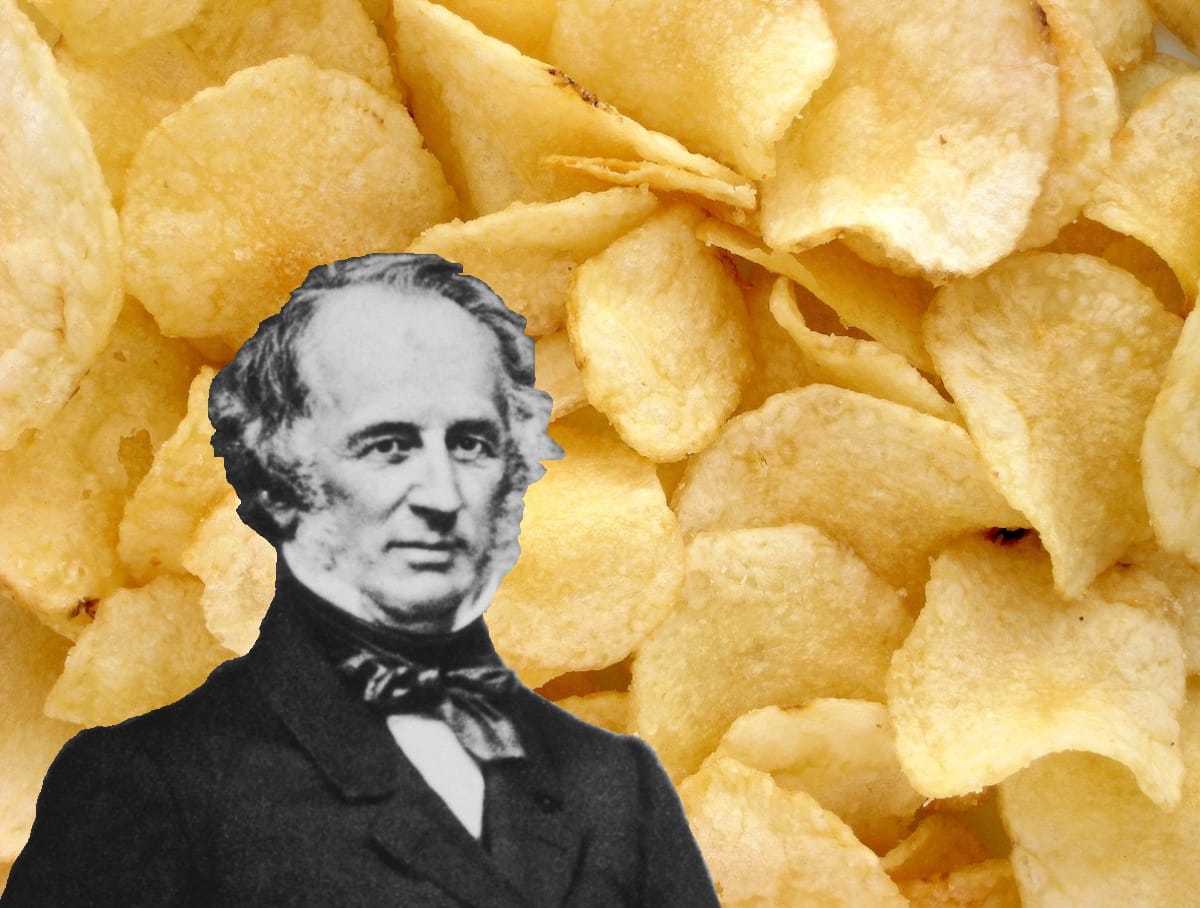In many sources, we can read that the railway king Cornelius Wanderbilt was directly related to the emergence of one of the most popular snacks in the world. We checked whether it really was.
Here's what the Internet magazine reports "The story of things": “The name“ chips ”comes from English chips, which means“ piece ”,“ slice ”. The history of the creation of chips begins in 1853, and they appeared quite by accident. Once Cornelius Vanderbilt, a millionaire from America, stayed at the Moon Lake House Hotel, which is located in Saratoga-Prings.
Having lunch at the hotel, Wanderbilt expressed his dissatisfaction three times that the potatoes were chopped by overly large slices. Local cook George Krum, being a man with a character, as a result, prepared thinly chopped potatoes fried in oil for the millionaire. Suddenly, the chef was to the taste of Vanderbilt's chef. He ordered him with pleasure every time lunch at the hotel. Thus, the saratog chips, as they were nicknamed, became a branded dish of a restaurant.
Seven years after the incident, in 1860, George Krum opened his own restaurant, where chips were served. However, over time, this dish appeared in other places of food, which is not surprising, since it is not difficult to cook chips. Soon, chips appeared on the menu of the best restaurants in America. ”
With certain details about this case, information resources such as "World 24","Radio Sputnik","RIA Novosti","Express Gazeta","Parliamentary newspaper","Kommersant","Business Petersburg" And "St. Petersburg Vedomosti".
Who are the main defendants in this story? George spect (1824–1914)-an American chef who became famous for working in a restaurant (and not a hotel at all) Moon’s Lake House in the resort town of Saratog-Springs, New York. In 1860, STE opened his own Crum’s restaurant in the neighboring town of Malta, which was very popular among people with a modest income and among millionaires. One of the last was Cornelius Vanderbilt - An entrepreneur who has been driving large transport resources for more than 60 years and founded a powerful dynasty. It is Vanderbilt, how counts, Back in Moon’s Lake House, the nickname Krum (“baby”) gave the species, but he was not offended, reasoning that “the baby is more than the grain” (English - Speck). Another version saysthat this nickname was wore still father of Syk, Jockey. One way or another, but today the sign near his former restaurant is called upon to perpetuate the idea of the species as a creator of chips.

The sign similar in content in 1976 was UsTanolen And in Saratog, near Moon’s Lake House, but he was soon stolen.
However, in this whole story there are a number of important circumstances, many of which surfaced due to the scrupulous research Folklorists of William Fox and May Benner, published in 1983.
1. In 1832, a recipe for thinly chopped fried potato circles was included in the American Culinary bookbased on an earlier English collection. Around the same years (and even a little earlier), such a recipe is found in other overseas publications. In general, an unambiguous answer to the question "Who invented chips?" does not exist.
2. Potato chips from the Moon’s Lake House menu gained fame in the middle of the XIX century. But information about this invention No Not in the 1891 article “Krum’s: the famous restaurant on Lake Saratoga” from The New York Tribune newspaper, nor in the custom -made biography of Krama, published in 1893, nor in the Necrologist of 1914 in a local newspaper. The article of 1885, which has not survived, costs a mansion, which quoted In 1940 and in which the “random” invention of Krama was first mentioned. At the same time, nothing is said about the dissatisfied client.
3. Kram himself never claimed that he was invented by chips. But in 1899, when he was still alive, about his championship She said His sister is Kate Wicks. The Necrologist WIX 1924 calls it precisely her creator of a popular dish.

Photo: Wikipedia
4. The first mention of Cornelius Vanderbilt due to chips and Krama appeared only in 1973. Company St. Regis Paper Company, which made packaging for potato chips, Placed In the popular periodicals of Time and Fortune, his advertising is a portrait of Krama with a signature: “This man was preparing for the Commodore Wanderbillet and Jay Gulda and created a billion dollars business.” Further, the story of a dissatisfied customer was already familiar to us, but it was not said that it was Cornelius Vanderbilt. Advertising had a great influence on the spread of the legend of the cook - already in 1976 in Saratog, the conference of the Association of Potato Chips and Outlets was held, after which the aforementioned sign appeared in the town.
5. The key role in the hit of Cornelius Vanderbilt in the story with the invention of the chips belongs to Mariel Whitney, the wife of the great -great -great -great -great vocabulary Cornelius. In the winter of 1976-1977, its representatives contacted the Saratog historian Violet Dunn with the intention of clarifying information about the birth of chips in this small American town. Dann reported what she knew, while not mentioning the name of Vanderbilt, and also allowed to photograph an old box from local chips.

6. And here in August 1977 about 250 guests Gathered In the Saratog estate of the Whitney family. The evening of the evening was the presentation of the publication entitled “Recipes of Potato Chips”, on the cover of which it indicated: “Dedicated to the 124th anniversary of the birth of potato chips and their creator to Commodor Cornelius Vanderbilt.” In the preface, the author, Mariel Whitney, reported that she learned about the invention of the founder of the dynasty a year before the meeting, when one of her friends sent her a newspaper notch with the same story. What specifically it was for the newspaper, Whitney did not report, without directly mentioning the name of George Krama. Nevertheless, the version of the story told by her was widely dispersed thanks to quotations in newspapers and numerous television interviews of a secular lioness. This caused a negative reaction to Violet Dunn, who later announced several times that she had not reported anything like that and could not report, since there was no data on the role of Cornelius Vanderbilt in the invention of potato chips. In addition, she called Mrs. Whitney "unprincipled." The scandal got to the point that the offended Whitney announced the refusal to spend annual secular evenings in Saratoga-Springs, which is why the local authorities began to calm and protect it in a hurry. As a result, the conflict was settled, and Witney even invited the historian to her next rapt, where she gave a book of recipes.

Photo: www.timesunion.com
Did the mistress of the Saratog estate have an personally entered her relative into this already unfounded story? The authors of the study believe that it is not: apparently, she really relied on a certain press release from the Association of Potato Chips and Outlets according to the results of the 1976 conference, and local legends have already mixed up-more precisely, some of their options. At least until 1976, Cornelius Vanderbilt was not directly mentioned in any printed version of the story. Add that, according to some data, the magnate, although he often visited Saratoga-Springs, the summer of 1853 spent a trip around Europe with his family.
Thus, there is no evidence in favor of the participation of Cornelius Wanderbilt in the invention of potato chips.
Not true
Read on the topic:
Social and Economic Contexts of Folklore Variants: The Case of Potato Chip Legends
If you find a spelling or grammatical error, please inform us of this, highlighting the text with an error and by pressing Ctrl+Enter.






